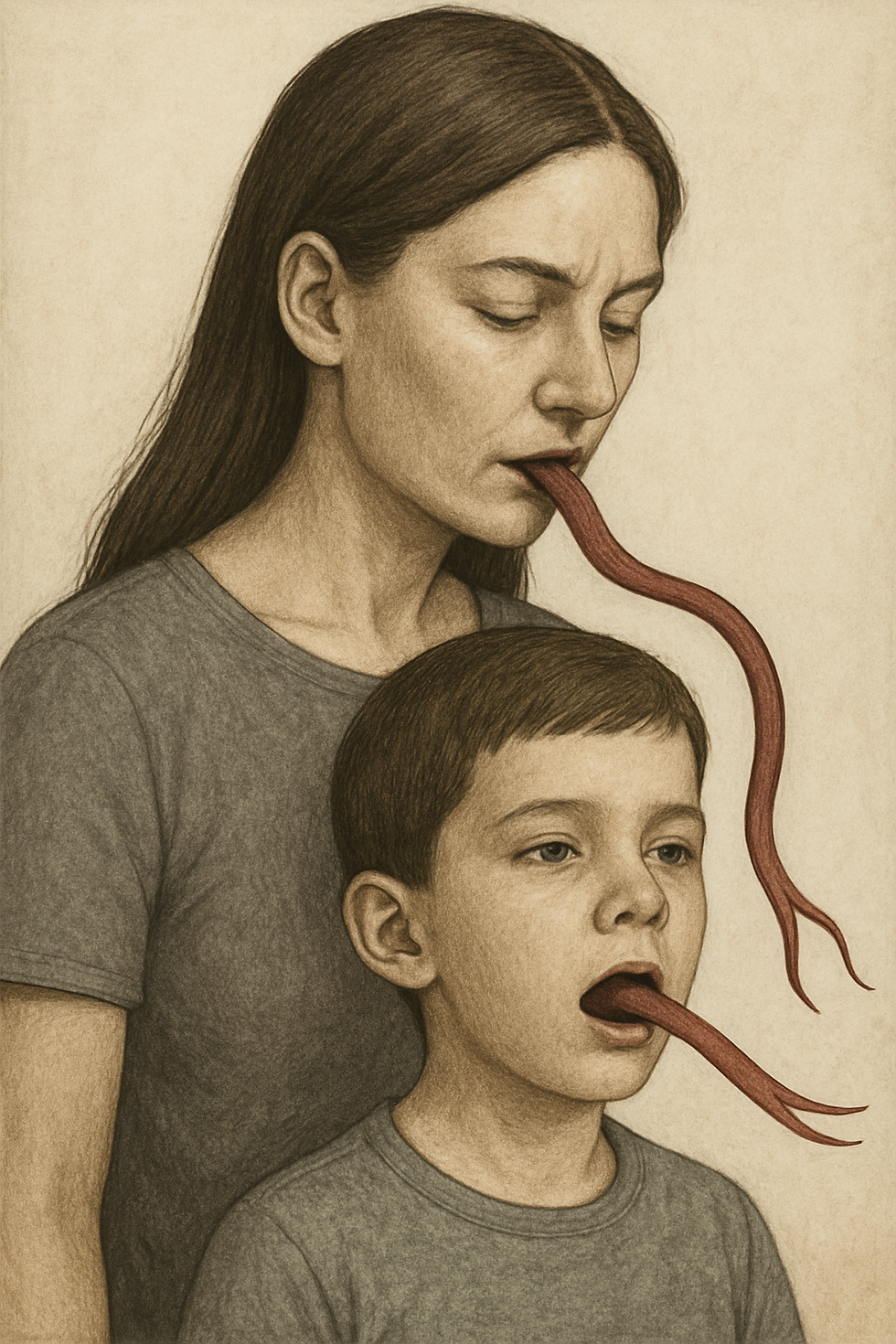Sarcasm = Scarcasm: Why Sarcastic Comments to Children Can Do More Harm Than Good
- Rachel Lynn, SLP

- Jul 21, 2025
- 4 min read
Updated: Jul 22, 2025
As adults, many of us use sarcasm without thinking. It’s common in everyday conversation, often meant to be humorous or lighthearted. But when sarcasm is directed at children—especially regularly or harshly—it can leave more than just a temporary sting. It can shape the way children view themselves, others, and how they interact with the world.
For neurodivergent children—especially Autistic children or those who are Highly Sensitive—sarcasm can be more than confusing; it can be deeply hurtful.
Sarcasm Isn’t Always “Just a Joke”
Sarcasm, by definition, involves saying the opposite of what you mean—often with a mocking tone. For example:
“Nice job cleaning your room,” when the room is clearly a mess.
“Oh, fantastic. You spilled the juice again.”
“Great idea, let’s all act like toddlers now.”
To an adult brain that understands nuance and social cues, these may come off as minor jabs or even jokes. But to a child—especially one who is still developing social understanding or who processes communication literally—these remarks can be confusing, painful, and internalized as criticism or rejection.
As Rachel Lynn, SLP experienced, "I remember sitting in a class in college and someone saying a cutting remark to me. I quickly responded that I didn't appreciate their sarcasm, but instead, I inadvertently substituted the word "scar-casm". I feel the word scarcasm is a more fitting word to use for certain uses of this type of humor."

Sarcasm = Scarcasm: Why Sarcastic Comments to Children Can Do More Harm Than Good
Why It Hits Harder for Neurodivergent Children
Autistic children, Highly Sensitive People (HSPs), and other neurodivergent individuals often interpret language in a literal, black-and-white manner. A sarcastic comment isn’t just misunderstood—it may be believed. When an adult says, “Wow, you’re so responsible,” after a child forgets their backpack, a child might not hear the joke—they might hear confirmation that they are irresponsible.
This miscommunication can result in:
Shame and low self-esteem: If a child believes sarcastic criticism is true, it reinforces negative beliefs about themselves.
Social difficulties: Neurodivergent children may struggle to detect sarcasm in peers and might repeat sarcastic phrases in a literal or inappropriate context.
Bullying behaviors: Children often model what they experience. A child who hears sarcastic, cutting remarks may begin using similar language with others—especially if they believe it's normal or "funny." Sadly, this can lead to them being perceived as rude, mean, or even labeled a bully.
The Ripple Effect of “Funny” Remarks
Children learn how to treat others by how they are treated. If sarcasm is a regular part of home life, it can become a part of their social toolkit—even if it's not developmentally appropriate or kind. A child who jokes, “Nice job, genius,” when a friend makes a mistake may not realize they’re being cruel. They may be repeating what they’ve heard from a trusted adult.
And when peers react negatively, or teachers intervene, that child may feel confused and hurt—“Why is it wrong when I say it, but okay when adults do it?” This can compound feelings of isolation or misunderstanding, particularly for children already navigating the world with a different lens.
What You Can Do Instead
If sarcasm has been your default communication style, this doesn’t mean you’ve failed your child. It’s never too late to shift toward more supportive and emotionally safe communication. Here are a few ways to start:
Speak directly and kindly: Instead of sarcastic criticism, offer constructive feedback.
Instead of: “Oh great, you spilled it again.”
Try: “Spills happen. Let’s clean it up together.”
Model emotional honesty: Let your child know how you really feel, with words they can understand.
“I’m frustrated that this keeps happening, but I know we can work on it.”
Teach about sarcasm: Explain what sarcasm is and why some people use it, especially if your child is neurodivergent. Let them know it’s okay if they don’t like it or understand it.
Set a tone of empathy and respect: Children absorb not just the words we say, but the tone and intention behind them. Choose words that build them up, not tear them down.
Final Thoughts
Every child deserves to feel emotionally safe with the adults in their lives. By being mindful of our words—especially sarcastic ones—we can help create an environment where children feel understood, supported, and respected. And when we raise children in homes that model empathy and kindness, we empower them to bring those same values into the world.
Kindness isn’t just what we say—it’s how we say it. And our children are always listening.
What do you think of our post: Sarcasm = Scarcasm: Why Sarcastic Comments to Children Can Do More Harm Than Good? Let us know in the comments.
Feeling Overwhelmed? You’re Not Alone
We believe parents should feel empowered, not overwhelmed. If you’ve got questions or want to learn more:
Leave a comment—we’d love to hear from you!
Join our Facebook Subscribers Group for just $0.99/month to access expert Q&As and exclusive content
Follow us on Instagram for helpful tips and real-life examples
Check out our YouTube channel for bite-sized videos packed with practical strategies and longer tutorials where we provide you important information
And remember, early support isn’t just intervention—it’s prevention, empowerment, and connection. And it’s never too early to be curious, ask questions, and seek guidance. We’re here for you, every step of the way. 🍼👣✨
With heart,
The NewDay Child Coaching Team
Rachel Lynn: Communication and Swallowing/Feeding Guide
Amber Michelle: Physical Development Guide
Amanda Rae: Fine Motor, Sensorimotor, Sensory/Feeding Guide
"Interweaving Disciplines and Knowledge for the Benefit of All™"
“Learn from us and with us™️”








The World needs more empathy :). Good article.